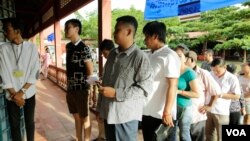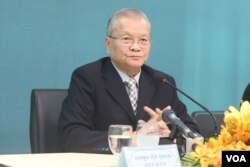The head of Cambodia’s official election body has said that high voter turnout in Sunday’s election should put to bed questions over the legitimacy of the vote.
Sik Bun Hok, president of the National Election Committee, told reporters after voting ended on Sunday afternoon that criticism of the election process by the international community had proven to be unfounded.
According to the NEC, some 80 percent of the 8 million eligible voters had cast a ballot.
“After this result we will wait and see the how international community will act against Cambodia,” he said. “The figure is the answer.”
The European Union, United States, Japan and others declined to participate in the election process or send official observers to monitor the vote in a break with protocol.
The ruling Cambodian People’s Party of Prime Minister Hun Sen is expected to win a comfortable victory after it banned the country’s main opposition party and threatened people taking part in an election boycott campaign with hefty fines and legal action.
Hun Sen and his wife, Bun Wany, voted in their home constituency of Takmao, Kandal province, on the outskirts of Phnom Penh, declining to comment on the election when asked my the scrum of journalists and photographers who turned out.
“I told you don’t ask, I have to respect the law,” Hun Sen said Sunday.
Prom Sereiy, a voter in Takhmao, said she disagreed with the boycott campaign. I want a good leader for the future of the country,” she said.
Plong Chansreymom, 36, a voter in Chaktomouk, Phnom Penh, said many Cambodians had gone to vote because “peace is more important than anything.”
Sam Chanthan, who ran a polling station in Kandal province, said the atmosphere during the election had been peaceful.
“It was a smooth election and nothing happened since the morning,” he said.
“The U.S. and E.U. said the election was not transparent and not fair, but the opposite is true. We have 20 political parties to compete, so it means this election is transparent,” Sam Chanthan said.
Several hundred international observers took part in the election, many from anti-democratic countries or states with questionable records of free elections.
Youssef Award, a Lebanese observer from the International Conference of Asian Political Parties, criticized the attitude of the international community towards Cambodia during the election process.
“You know this is an old story. Whoever has the power, they want to exercise the power on other countries and this is political,” he said.
Filippe Dessaint, an observer from France, said: “When I say good impression, I see the organizations, the way that Cambodian people are going to vote, it is easy to understand.”









